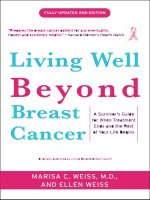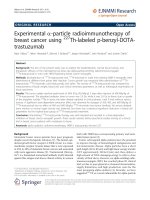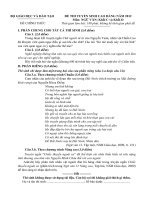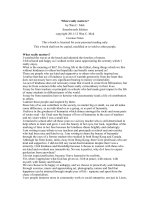Living Well Beyond Breast Cancer by Marisa C. Weiss, M.D. pptx
Bạn đang xem bản rút gọn của tài liệu. Xem và tải ngay bản đầy đủ của tài liệu tại đây (768.88 KB, 42 trang )
Fully Updated Second Edition
Living Well
Beyond
Breast
Cancer
Marisa C. Weiss, M.D.
Ellen Weiss
A Survivor’s Guide
for When Treatment
Ends and the Rest
of Your Life Begins
Weis_9780307460226_3p_all_r1.qxp:Layout 1 10/6/09 9:34 AM Page iii
PDF
Copyright © 1997, 1998, 2010 by Marisa C. Weiss and Ellen T. F. Weiss
All rights reserved.
Published in the United States by Three Rivers Press, an imprint of the
Crown Publishing Group, a division of Random House, Inc., New York.
www.crownpublishing.com
Three Rivers Press and the Tugboat design are registered trademarks
of Random House, Inc.
Previous editions of this work have been published as Living Beyond Breast Cancer by Times
Books, a division of Random House, Inc., New York, in 1997, and by Three Rivers Press,
an imprint of the Crown Publishing Group, a division of Random House, Inc., New York,
in 1998.
Library of Congress Cataloging-in-Publication Data
Weiss, Marisa C.
[Living beyond breast cancer]
Living well beyond breast cancer : a survivor’s guide for when treatment ends and the
rest of your life begins/Marisa C. Weiss, Ellen Weiss.—Fully updated 2nd ed.
p. cm.
Originally published: Living beyond breast cancer. New York : Times Books, 1997.
Includes index.
1. Breast—Cancer—Popular works. 2. Breast—Cancer—Psychological aspects.
3. Adjustment (Psychology) I. Weiss, Ellen. II. Title.
RC280.B8W396 2010
616.99'449—dc22 2009020648
ISBN 978-0-307-46022-6
Printed in the United States of America
Design by Meryl Sussman Levavi
10 9 8 7 6 5 4 3 2 1
Revised Edition
This book cannot and must not replace hands-on medical care or the specific advice of
your doctor. Use it instead to help you ask the right questions, make the right choices,
and work more closely with your doctor and other members of your health care team.
Weis_9780307460226_3p_all_r1.qxp:Layout 1 10/6/09 9:34 AM Page iv
www.ThreeRiversPress.cm
LivingWellBeyond
Topurchaseacopyof
BreastCancer
visitoneoftheseonlineretailers:
www.ThreeRiversPress.cm
Acknowledgments ix
Introduction: Living Well Beyond Breast Cancer xi
PART ONE
Treatment Over, On with Your Life
1. Over, Not Over 3
2. Support: Building a Network 15
PART TWO
Additional Care Beyond Treatment
3. You and Your Doctors: Continuing Care 33
4. You and Other Health Care Professionals: Allied Care Team 63
5. Tests: Peer, Poke, Prod 76
6. After Mastectomy: Re-creating a Breast—With or
Without Surgery 109
7. Ongoing Therapy: Hormonal, Herceptin, and
Other Treatments 141
PART THREE
Coping with Side Effects of Treatment
8. Fatigue and Loss of Energy 163
9. Understanding and Controlling Pain 173
10. Swelling (Lymphedema), Stiffness, and Skin Changes:
Prevention and Management 205
11. Hair Loss and Nail Changes: Terrible but Temporary 230
Contents
G
Weis_9780307460226_3p_all_r1.qxp:Layout 1 10/6/09 9:34 AM Page vii
www.ThreeRiversPress.cm
12. Bone Health: Weaknesses and Strengths 247
13. Thinking and Remembering: Clearing the Fog and
Sharpening Your Mind 268
14. Menopause and Growing Older: Hot and Cold, Wet and Dry 285
PART FOUR
Caring for Your New Self
15. Sleep: Restoration and Renewal 315
16. Your Immune System: Blows and Boosts 329
17. Sustenance: Nutrition and Supplements 338
18. Weight and Exercise: Gains and Losses 358
19. Intimacy, Sex, and Your Love Life 380
20. A Child in Your Future: Fertility, Pregnancy, Adoption 399
PART FIVE
Preventing and Managing Recurrence
21. Reducing the Risk of Breast Cancer 425
22. Recurrence: If Cancer Comes Back 443
23. Endings: Comfort, Closure, and the Circle of Life 459
Conclusion: Through Crisis Comes Opportunity 481
Index 487
viii
•
Contents
Weis_9780307460226_3p_all_r1.qxp:Layout 1 10/6/09 9:34 AM Page viii
www.ThreeRiversPress.cm
G
Acknowledgments
W
e are deeply grateful to the many individuals who infused our
book with their extra special blend of expertise, wisdom, spirit,
humor, warmth, and compassion. The principal editor of our book,
Lindsay Orman, was a pleasure to work with and did an absolutely
amazing job. The care and attention and intelligence she brought to
her task was beyond anything we could have imagined, or anything
other writers we know have experienced. Emily Timberlake guided the
book to its launching with thoughtful dedication.
So many voices are heard in this book: the people who shared their
stories with us, the patients and their families Marisa has had the
privilege of taking care of, and those who have shared our mission. Each
person has contributed in a most personal way—eagerly or reluctantly,
expansively or cautiously—with honesty and courage and verve—moved
by the desire to help others. The book would have fallen flat without the
voices of these many good friends. (Most of their names have been
changed to protect their privacy.)
We want to acknowledge the diligence, dedication, and unflagging
spirit of these many friends—it’s impossible to thank them enough. We
have also had help from a generous and distinguished group of pro -
fessionals, and we want to thank them for their invaluable con tri bu tions:
Zonera Ali, Robert Allen, Jayne Antonowsky, Rachael Brandt, Irene Card,
Ned Carp, Carol Cherry, Robin Ciocca, Jan Clark, Martha Denckla,
Dianne Dunkelman, Beth DuPree, Brenda Eastham, Barbara Fowble,
Kevin Fox, Patricia Ganz, Paul Gilman, Robert Goodman, Generosa
Grana, Jennifer Griggs, Barbara Hoffman, Clifford Hudis, Carole
Kaplan, Harvey Karp, Rosalind Kleban, Anton Kris, Maria LoTempio,
Geralyn Lucas, Cynthia Lufkin, Christina Meyers, Kathy Miller, Lillian
Nail, Larry Norton, Kutluk Oktay, Steve Osborne, Edith Perez, Barbara
Rabinowitz, Joan Ruderman, Andrea Rugh, Jennifer Sabol, David Sachs,
Weis_9780307460226_3p_all_r1.qxp:Layout 1 10/6/09 9:34 AM Page ix
www.ThreeRiversPress.cm
Romayne Sachs, Andrew Saykin, Mitchell Schnall, Sandra Schnall,
Helena Schotland, Leslie Schover, Lynn Schuchter, Joseph Serletti,
Gloria Shattil, Lillie Shockney, Robert Smink, Alan Stolier, Margo
Weishar, Beverly Whipple, Eric Winer, Anna K. Wolff, and Liza Wu.
We are deeply grateful to our Breastcancer.org friends and Board of
Directors: Ray Westphal, Amanda and Conrad Radcliffe, Jenifer and Jeff
Westphal, Stevie Lucas, Lisa Kabnick and John McFadden, Peggy and
Bruce Earle, Betty Moran, John Chappell, Barbara and Henry Jordan,
Marjorie Findlay and Geoffrey Freeman, Sean Rooney, Barbara and
Larry Cohen, Jill and Tom Nerney, Noreen Fraser, Patty and Gary
Holloway, Aileen and Brian Roberts, Jerry Crowther, Glenn Crowther,
Michael Hirschhorn, JoAnn and Joe Thomson, Roz and Chuck Epstein,
Sallie and Charlie Grandi, Betty and Phil Harvey, Judy and Michael
Mealey, Patty and Brian Holloway, Marge Tabankin, Richard and
Maureen Yelovich, Jack Lynch, Elaine Thompson, Sarah Peterson, Erin
Dugery, Kathy Schneider, Jessica Laufer, Denise and David Jordan, Sara
Vance and Michelle Waddell, Fiona and Lee Yohannon, Lisa Petkun,
Eleanor Davis, Shari Foos, Joanne Gillis-Donovan, Richy Glassberg,
Sheri Lambert, Christopher Lyons, Jim Monastero, Susan Muck, Nina
Montee-Karp, Larry Norton, Debbie and Sam Schwartz, and Hope
Wohl. We want to extend a very special thanks to each member of our
amazing Breastcancer.org and Lankenau Hospital teams, and to our
friends from the Living Beyond Breast Cancer organization.
Always there for support, advice, comfort, care, and feeding, our
families patiently endured our neglect and absence as we worked away
at this book. Thank you, Elias, Henry, Isabel, and David Friedman, and
Leon Weiss—you who waited with such good grace till all this book
business was finished and still remembered who we were. Plus a big
thanks to our other family champions: Alice, Eve, Nathaniel, Philip, and
Stephen Weiss, and Adele Friedman; Aaron, Daniel, Lena and Rob
Walker; Cindy Kling; John, Ella and Owen Spencer; Lauren, Sara, and
Livia Weiss; Sara Manny, Adam and Ethan Weiss.
And we want to thank each other: for patience and good humor, for
holding back and holding on, for drive, energy, and the right word.
Close as we are, as mother and daughter, we have a new appreciation for
each other’s depths and gifts.
Marisa Weiss and Ellen Weiss
x
•
Acknowledgments
Weis_9780307460226_3p_all_r1.qxp:Layout 1 10/6/09 9:34 AM Page x
www.ThreeRiversPress.cm
G
Introduction
Living Well Beyond Breast Cancer
L
ife has thrown you a curve: breast cancer. What do you do with that
hit? There is only one you—you are unique, after all—and you
have worked so hard to protect your life from the threats and challenges
of this disease: subjecting yourself to all manner of tests, procedures,
surgery, chemo, radiation, and hormonal therapy, as well as countless
medications and then remedies to deal with side effects. You may not
have known what was up, down, or coming round the next corner. But
here you are: done! It’s now time to find your path through recovery
to living well beyond breast cancer with the best information, solid
guidance, new hope, and determination.
Remember, the purpose of all that treatment, all your work, was to
give you back your life: joy, fun, comfort, meaning, pleasure, security.
And the main reason for writing this book is to help you reclaim,
rebuild, and reenergize your life, understanding that you are not alone,
as you may have feared.
For sure, you are not alone. In the eleven years since the original
publication of this book, the amount of medical information about
breast cancer has more than doubled. Almost three million more
Americans have joined the ranks of the three million already diagnosed
with the disease—and major medical advances have given more and
more of these people the chance to live well beyond breast cancer.
To make the most of the latest and greatest, you need to be in the
know, informed by your link to medical care—your primary care
physician. Easier said than done when the average length of a doctor
visit has shrunk to seven minutes! So what do you do? Turn to resources
available in print, online, wherever.
Weis_9780307460226_3p_all_r1.qxp:Layout 1 10/6/09 9:34 AM Page xi
www.ThreeRiversPress.cm
I wrote this book—together with my mother, Ellen Weiss, a writer
and breast cancer survivor—to give you the best medical information
and guidance to help you live as long as possible with the best quality of
life, and to reassure you that you are not alone. Each page will help you
understand the challenges in your path and provide you with many
ready-to-use practical solutions to speed your total recovery and reclaim
your life.
As a physician specializing in breast cancer for over twenty years,
I have had the honor of taking care of thousands of women and men,
and their families, facing breast cancer. It wasn’t long after I started
practicing that I understood the high level of distress that my patients
endured on completion of initial treatment. Rather than feeling
thrilled to have the breast cancer experience behind them, they were
uneasy, often anxious: What do I do now? Am I really cured? Is it safe for me
to get pregnant? Can I take hormones? How do I get rid of extra weight? How do
I manage the lingering side effects of treatment? How do I extinguish those
horrible hot flashes? How can I stay asleep through the night? What should I tell
the man I’ve just met? How do I deal with the fear of recurrence? What should
I be eating, taking, and doing to reduce the risk of recurrence? Does my diagnosis
put my daughter at risk? My patients desperately wanted an intelligent, in-
depth, reliable response to their questions as they moved from “I have
breast cancer” ahead to “I am leading a normal life.”
To provide the best answers to my patients and to countless others
beyond the scope of my practice, I started the program Life After Breast
Cancer at the University of Pennsylvania twenty-one years ago, then a
year later the nonprofit organization Living Beyond Breast Cancer.
Both are still thriving today. But to provide a 24/7 resource for medical
information for people worldwide, we needed something more. So in
1999, I started the nonprofit organization Breastcancer.org and have
worked tirelessly at making it the number one resource in the world for
breast health and breast cancer information and the most visited online
community for the exchange of personal experience and expertise.
I am immensely proud of these absolutely indispensable organizations
and all of the wonderful, talented, and dedicated people who run them.
Nonetheless, I am most aware of the power and comfort that only comes
from a book you can hold in your hand, in the intimacy of time and
place.
xii
•
Introduction
Weis_9780307460226_3p_all_r1.qxp:Layout 1 10/6/09 9:34 AM Page xii
www.ThreeRiversPress.cm
To provide you with your personal, private, and convenient resource
on survivorship, we wrote the first edition of this book, Living Beyond
Breast Cancer, in 1997. We have been deeply gratified by the many letters
and emails we’ve received telling us how helpful, of the moment, our
book has been. And we’ve been inspired by the demands for a second
edition. Thus, we are extremely proud to present our newly titled, fully
updated book: Living Well Beyond Breast Cancer—our way to help give you
countless new opportunities for living a life of health and happiness.
Introduction
•
xiii
Weis_9780307460226_3p_all_r1.qxp:Layout 1 10/6/09 9:34 AM Page xiii
www.ThreeRiversPress.cm
G PART ONE
Treatment Over,
On with Your Life
Weis_9780307460226_3p_all_r1.qxp:Layout 1 10/6/09 9:34 AM Page 1
www.ThreeRiversPress.cm
G CHAPTER ONE
Over, Not Over
I never forget. Cancer has become part of my consciousness, part of
my society. With every cancer death, my heart turns over. I’m always
amazed at how other people take their lives for granted, as if they’ll
live forever.
I became assertive, someone I’d never been. I had a new voice. I said
whatever I felt, like a cranky old lady. I knew nobody would stop me.
I took my husband to an auction, my first post-treatment outing;
I bought a few things, and he asked, “What are you going to do with
this junk?” I exploded—I just couldn’t help myself: “You should be
thanking God I’m interested in something again!”
Right after treatment I felt very old, and lost, like I was looking into
my grave. I got help, and it took a while, but I came around to feeling
reborn, reinvented.
G First Things First
I
t’s over. Treatment, that is. You’ve survived the initial ordeal. Now
what? No one hands you an instruction manual as you go from under
treatment to beyond treatment. From Geralyn Lucas’ book Why I Wore
Lipstick:
I make a list of everything I want to do. Should I quit my job,
leave my husband, travel the world? I decide that maybe the
most courageous thing I can do is to try to return to my regular
Weis_9780307460226_3p_all_r1.qxp:Layout 1 10/6/09 9:34 AM Page 3
www.ThreeRiversPress.cm
life, with the knowledge that there is nothing regular about it.
Since everything has changed, how could we remain the same?
Maybe it’s been two weeks, maybe two years, maybe twenty. But no mat-
ter how little or how much time has passed, the breast cancer experience
is never completely over. Active issues, leftover concerns, and reminders
can dog you every day or pop up just once in a while.
When it’s all over, just when you think you should be celebrating
this huge accomplishment, you may feel worse than you did during
treatment. How confusing and disorienting. It starts to make sense
when you realize that all parts of your life have been touched by the
breast cancer experience. It may have taken over your life: bills, taxes,
job, vacation, housework, and even children were put on hold.
Now, with the end of treatment, you have to adjust back to normal.
But is that really possible? The fact is, life changes after breast cancer
treatment. Normal will never look and feel exactly the same. The only
thing you can do is to go forward with the rest of your life, one step at a
time. You have to find and create your new normal. Many of you speak
of how changed you are, almost renewed. This is my hope for each of
you as you read my book: a chance to renew your life, one that brings
you comfort, meaning, joy, fun, and hope.
Throughout this book, I will help you understand the challenges
and identify the solutions to help you live well beyond breast cancer.
We’ll start by looking at the issues you’ll begin facing immediately after
treatment.
G Challenges
Y
ou can cope with this new life. Countless women have done it and
are doing it. When you feel as wobbly inside as a new toddler or as
stiff and creaky as a little old lady, draw strength from these other sur-
vivors. They understand that your cheery front is covering up the vul-
nerable, exhausted you. And unlike many others, they appreciate this
new you. In time, you will, too.
When chemo is all over, the supportive care is over, too. You’re worn
down by the accumulated side effects of all your treatments with nearly
4
•
Living Well Beyond Breast Cancer
Weis_9780307460226_3p_all_r1.qxp:Layout 1 10/6/09 9:34 AM Page 4
www.ThreeRiversPress.cm
no pick-me-ups. That’s when many of my patients tell me they barely
feel as if they’re among the living.
Separation Anxiety
After months or more of concentrated attention on you, your illness,
and your therapy, you come to that moment when the days mapped out
for you by hour and procedure come to an end. Many of my patients felt
thrown into an emotional limbo: “ ‘Come back in three months,’ the
doctor said. I felt like I was dumped, and I was so frightened,” Janet
recalled.
Your health care team provided emotional support you may not have
fully appreciated when so many things were happening to you at once—
and at the end of your whirlwind treatment experience, you suddenly
miss it. “I felt more scared after treatment was over than I did before it
started,” said Gena. “During treatment I had peace.” The scheduled rou-
tine and plan of attack were very comforting, and now they’re gone.
“When treatment ended, I didn’t know what to do with myself,” Christy
recalled.
With the end of treatment, your family and friends generally con-
clude the disease is beaten and done with. There’s usually a shower of
congratulations and celebrations. But you don’t feel like yourself.
You’re still feeling disoriented and conflicted: profound relief and
exhilaration mixed with uncertainty and forced enthusiasm. “I dreaded
going to my own end-of-treatment party,” one woman said. You’re
expected to feel great and back to normal and ready to get on with your
life, but instead you feel lost. Separation anxiety takes on new meaning.
Lingering Concerns
As you move forward, a string of troubling questions can pollute your
peace of mind:
•
What do I do now?
•
Where’s my support?
•
Can I really get along without my doctors and nurses?
•
When do I get to see my doctor again?
Over, Not Over
•
5
Weis_9780307460226_3p_all_r1.qxp:Layout 1 10/6/09 9:34 AM Page 5
www.ThreeRiversPress.cm
•
Now that I don’t see my doctors every day or every week, how do
I get all my questions answered?
•
What about that new treatment that I just heard about on TV—
does it apply to me?
Flooded with these kinds of questions, you can feel fearful and
insecure—making you wonder: Can I ever handle my life on my own again?
Cancer Worry
Even if you’ve been discharged by your doctors, there’s likely still that
cancer worry in a corner of your mind: “Every time something hurts or
I get sick, I think the cancer has come back.”
You may also fear that the cancer might grow back because you are
no longer doing anything active to keep it away. Annamarie’s coping
mechanism was ceaseless activity: “I got depressed . . . cancer was still on
my mind twenty-four hours a day. I started looking for things I could do,
things I still had to decide about, like diet, exercise, tamoxifen, anything
I could possibly do to avoid recurrence.” You may also worry whether
the treatment really worked, whether you’re fit to be discharged.
Cancer worry is something you must learn to manage and live with.
“Like a whale that moves into your living room” is how one patient
described her lingering fears of breast cancer. “Over time, the whale
gets smaller, but it never quite goes away completely. A tenant you can’t
get rid of. Maybe it gets down to the size of a magazine rack. Once in a
while you bump into it, and sometimes it swells up into your face again,
like when you have a mammogram and they call you back for extra
views.”
Cancer worry dogs most of the people I take care of—a little or a
lot. They carry it with them indefinitely, even as year after year proves
them disease-free. Over time, the burden gradually gets processed,
loosens its grip, and gets put in its place.
Denial
Quite a number of people shut the door after treatment, saying cancer
is over and done with. That may be the only way for them to deal with
6
•
Living Well Beyond Breast Cancer
Weis_9780307460226_3p_all_r1.qxp:Layout 1 10/6/09 9:34 AM Page 6
www.ThreeRiversPress.cm
what’s happened. Five, ten, or more years may pass without processing
that cancer experience, leaving important issues unresolved and the
accompanying fear and anxiety buried deep. They may go on to other
things without any difficulty, living their lives without active fear.
Then along the way, something may happen that sets things off:
•
A suspicious mammogram
•
A bout of arm edema
•
Heavy media coverage during Breast Cancer Awareness Month
•
A close friend or family member diagnosed with breast cancer
•
A daughter reaches her mother’s age at diagnosis.
•
The recurrence of, or a new, cancer
These events jolt them from the wall of denial where they’d previ-
ously sought refuge and into a harsh new reality where buried emotions
may erupt with destructive force.
Low Energy Versus High Expectations
You’re likely to be bombarded by heavy expectations upon the end of
treatment—from yourself and others. Everything you put off till you got
your strength back is waiting for you, but you’re still dogged by fear and
fatigue. You just can’t handle it!
The uncertainty of the past, present, and future is still with you,
overwhelming and exhausting you. “Not knowing what will be is worse
than knowing the worst. It was a living hell.” The hardest thing to deal
with is this uncertainty—it can consume all your energy.
Even high-energy women are laid low. “I gave up on my superwoman
image. It was costing me too much.” Some of these formerly high-
powered women feel discouraged, useless, and unable to accomplish
anything important. “It takes all day to do one thing!” You may be able to
do little more than finish up treatment and begin the recovery process.
So there you are, projects waiting, not knowing where to start, still
exhausted. And there’s your family, waiting for you to take over again,
looking for the attention they’ve been missing all this time. Christy
recalled, “I had to act like I could just flip a switch and not be a cancer
patient—as if it were possible.”
Over, Not Over
•
7
Weis_9780307460226_3p_all_r1.qxp:Layout 1 10/6/09 9:34 AM Page 7
www.ThreeRiversPress.cm
Family members and close friends can only meet some of your
needs some of the time. By the time treatment is over, their energy,
goodwill, and empathy may bottom out. For Donna’s husband, the issue
was simple: “I don’t want to hear about your illness anymore. Put it away.
It’s done.” “If there are no ‘support receptors’ in your family, you may
not be able to put them there,” commented Molly. Support can be as
much a part of your cure as anything else; unfortunately, you may need
it most when you find it dwindling.
Depression
Is it any wonder that many people become depressed after their main
treatment is over? You are most vulnerable to depression at the time
of diagnosis and again when your treatment is completed. “I thought I
was dealing with everything just fine, but I wasn’t. I couldn’t. Everything
fell in on me. I became clinically depressed shortly after the end of my
chemotherapy.”
While depression upon diagnosis seems obvious, experiencing
depression at the end of treatment is unexpected and counterintuitive.
But it’s pretty common to be overwhelmed with feelings of helplessness
that can peak after treatment is over. It’s normal to find yourself angry,
sad, and depressed in this period of transition.
There is some good news to help move you through this funk.
Time alone solves some things, and there may be some calm after
the storm. But you can’t just kick back, expecting, waiting, and hoping
for things to get better on their own. Don’t neglect troubling symptoms.
Now is the time to take care of your whole self. With this book and through
Breastcancer.org, we’ll help you find and create small and big opportu-
nities for recovery and renewal.
Telling
Disclosing your breast cancer experience can be hard or easy. Sometimes
it just happens. “I didn’t want to talk about it, and then this woman I’d just
met at a party mentioned her work with breast cancer survivors, and
I found myself telling her things I’d never told anyone, years and years
after I’d been through with it. Maybe I was just waiting for the right
8
•
Living Well Beyond Breast Cancer
Weis_9780307460226_3p_all_r1.qxp:Layout 1 10/6/09 9:34 AM Page 8
www.ThreeRiversPress.cm
moment, or the right person.” Molly was a well-balanced, self-assured
woman who surprised herself with the release of this flood of suppressed
feelings.
For Sylvie, telling everyone she had breast cancer felt like a respon-
sibility. “I don’t think it’s good for anybody to be quiet about this dis-
ease. Not if we want to find a cure, find the money for research, get
women active in the cause.” Lily came from a prominent business family
in a major city, and telling her story brought her into the public eye on
TV and in the newspapers. “I was deluged. All kinds of organizations
asked me to speak to their members, and I did. I believe a lot of women
went and got mammograms because of my story, as they did with Betty
Ford, Happy Rockefeller, and Nancy Reagan.”
Some of the women I’ve worked with are so self-conscious about their
illness, they feel almost as though they’re wearing a sign and they need to
explain: “I stood there in the supermarket, telling this sympathetic check-
out clerk my entire history.” Others, however, mull over whether or not to
share this painful experience with their closest friends. And how do you
tell a new boyfriend or lover? (See Chapter 19, on intimacy.)
Others, like Gena, prefer to stay quiet. “I decided not to tell my
friends—and my doctor told me not to. This was many years ago. I was
very young. I didn’t want people clucking over me, feeling sorry for me,
being nice to me just because I’d had breast cancer. I kept my mouth
shut for twenty years. It was a different time.” Betsy would have agreed
with Gena. “People ask me, ‘How are you?’ with this woeful eye. Like
I’m so brave but really dying. Or they say, ‘How good you look!’ with real
surprise, as though I should look half dead. Or I do look half dead and
they lie through their teeth and say, ‘How great you look!’ Who needs
all that?” No one really likes a pity party.
Of one thing most of you are sure: you don’t want friends telling
you sad tales. Annamarie would stop people midbreath and say: “I only
listen to stories with happy endings.” How can reasonable people be so
thoughtless with misplaced reassurance? Maybe they think they must say
something but don’t quite know what or how. Or maybe they’re express-
ing their own fears. Whatever the reason, these stories about sickness and
death that others may want to unload can hurt. Stop them the moment
you sense what’s coming. Use Annamarie’s “happy endings” line. There
are plenty of stories with good outcomes for you to hear.
Over, Not Over
•
9
Weis_9780307460226_3p_all_r1.qxp:Layout 1 10/6/09 9:34 AM Page 9
www.ThreeRiversPress.cm
Telling may help others deal with your situation but may do little to
help you. You’re the one who can end up giving support, often getting the
energy sucked out of you to help someone else. Still, most women do tell
their friends and co-workers. “I don’t like to be with people who don’t
know,” said Florrie. “It makes it so much easier at work. And everyone is so
supportive and kind, in many loving ways. Maybe I talk about it too
much.” Ginnie told her friends but she felt she had to hide it at work
because she was worried about keeping her job and her health insurance.
G Solutions
M
any of you come away from the breast cancer experience with a
clearer view of what matters most in life. Cancer has changed
your life. And maybe not surprising to you, but surely surprising to peo-
ple who’ve never had cancer, is the repeated comment “My life is so
much better now,” or “We’re a much closer family now than we ever
were before.” That does not include, however, the individuals and fami-
lies that come apart, unable to manage this crisis. Between these
extremes are the people who chug along much like everybody else, deal-
ing with everyday issues and keeping their past health problems on a
short leash.
The New You
“I’ve chucked so much garbage.” “I don’t suffer fools.” “I take risks I
never did before.” “I take better care of myself.” “I’m more assertive.” “I
don’t worry about unimportant details.” “I won’t let people take advan-
tage of me.” “I’m able to make changes I always needed to make.” “I stop
and look around at new things.” “I’m much kinder to myself.” “I take
nothing for granted.” “I don’t waste time.”
So many people who have been diagnosed with breast cancer have
said to me: “I want to find meaning and fulfillment in each day. I want to
build memories.” Workaholics take time off. Trivial matters are seen for
what they are. “I used to get all worked up in traffic; now I’m happy just
sitting there.” Laughter and merriment are prized; hugging takes on
major importance.
10
•
Living Well Beyond Breast Cancer
Weis_9780307460226_3p_all_r1.qxp:Layout 1 10/6/09 9:34 AM Page 10
www.ThreeRiversPress.cm
Many of you say you no longer put off what you really want to do.
“I’m doing things I’d talked about doing for years: I’m going to gradu-
ate school, for starters,” Vivian told me with pride. Just don’t take on too
much: “I’ve been trying so hard to do all the things I enjoy. It’s too
stressful—it’s wearing me out!” Jenny said with irritation. Knowing your
priorities will help you save your energy for the things that matter to
you most.
Managing Expectations
For self-preservation and self-defense, you have to control and protect
yourself from unreasonable expectations. Don’t let your family’s expec-
tations for you get out of hand. Keep a reality check on work expecta-
tions. Even more important, don’t expect too much of yourself. Stop
comparing yourself to others and judging your performance.
You may know someone who sailed through treatment, went back to
work full-time the week after surgery, and seemed to take complete care
of her family, job, house, and community obligations. Unlikely—but so
what! If that’s not you (or most women I know), it’s not relevant. Stop
measuring yourself against people who may be driving themselves into
the ground. Keep your head, and make your family see you as you are
and treat you as you need to be treated. Push back on expectations: say-
ing no to a new request or demand often means saying yes to your recov-
ery and renewal. Throughout this book, we’ll be giving you solutions for
managing expectations and setting reasonable limits.
Fortifying Your New Support Network
There is no reason to go through breast cancer treatment and recov-
ery alone. That kind of isolation without support can itself be life-
threatening. Your psychological needs deserve as much attention as
your physical needs. You worked extremely hard to get the best treat-
ment possible to protect your body against breast cancer; now it’s time
to take the best care of your emotional needs and the whole you.
Other people who have experienced breast cancer can provide
you with indispensable information and support. You don’t need to
start from the beginning and explain everything all over again—they
Over, Not Over
•
11
Weis_9780307460226_3p_all_r1.qxp:Layout 1 10/6/09 9:34 AM Page 11
www.ThreeRiversPress.cm
understand. Florrie explained: “I decided to go someplace where others
knew it wasn’t over, where I could tell this complete stranger about my
history and feelings, knowing what we share.” This shared experience
has been the foundation of many beautiful friendships.
For more on building your support network–whether online, by
phone, in a group, or though a therapist–see Chapter 2.
Get Answers to Your Questions
You need to acknowledge your fears, rid yourself of uncertainty, and set
straight your misconceptions. Start by writing them down, putting your
biggest concerns at the top of the list. Assign a go-to person or expert
next to each entry. For example, here is just one of many steps you can
take to get answers to the following sample questions:
•
Does my diagnosis increase my daughter’s risk?
~
Talk to your family doctor and make an appointment with a
genetics counselor to review your full family history and see if
genetic testing would be useful.
•
How do I talk to my daughter about breast health?
~
Check out my book Taking Care of Your “Girls”: A Breast Health
Guide for Girls, Teens, and In-Betweens to learn how to get this
delicate conversation going and to become knowledgeable
about the kind of information she might ask about.
•
What’s my risk of recurrence?
~
Talk to your oncologist and find out your chances of staying
cancer-free and your risk of recurrence. Also ask what
additional steps you can take to maximize your chances of
doing well.
•
What about that new treatment I heard about on the news—would
I benefit from it?
~
Breastcancer.org presents research news every day along with a
Take-Home Message, making it easy to discuss this with your
doctor.
Once you’ve written out your concerns and ideas for addressing
them, follow through to get the information you need. Answering your
12
•
Living Well Beyond Breast Cancer
Weis_9780307460226_3p_all_r1.qxp:Layout 1 10/6/09 9:34 AM Page 12
www.ThreeRiversPress.cm
questions and replacing myths with facts is very therapeutic and will
expedite your recovery.
Taking Care of Yourself
Stop and give yourself credit for the hard, hard work you’ve done to
fight for your life.
Now you have to take the time to heal. Push back. Indulge yourself.
Give yourself a reward. Treat yourself better. Go on a vacation. “Each
year on my anniversary I am in a beautiful place, celebrating life,” Jo
told me. “If you feel like crying, do it. If you need help, get it. Give your-
self time—the biggest gift—for recovery. Don’t let anyone make you feel
guilty, and don’t take on things you’re not ready for. It isn’t as easy as
one might think to put yourself first. Grab what you want and need.
I was too brave, always protecting others. Now it’s my time.”
No normal human being has the time or emotional wherewithal to
process the whole breast cancer experience until the major impact of
treatment is over. This is one more reason why the end of treatment is
such an unexpectedly hard time. “My stress and anxiety became more
apparent to me after I finished therapy than when I was going through
it,” Donna reflected. “I was given this really big test—and I passed. I can
wake up and not think first thing about cancer. I can go to work and feel
good all day. There is life after cancer! I am who I am; I am not defined
by that disease. Breast cancer is behind me.”
G Moving Forward
I
t’s important to put the recent past in perspective as you focus on a
healthy future. “I didn’t choose this disease and I wasn’t going to let
it control me. I had a good life before, and this bad thing wasn’t going
to change my life for me. I was going to make life good again,” Gena
said. “You don’t want to disappoint yourself; you don’t want to let your-
self down. So you make yourself come through. That was thirty years
ago—and it has been good!”
You did everything you could do to become cancer-free using the
best treatments available to you at the time. Moving forward, you will
Over, Not Over
•
13
Weis_9780307460226_3p_all_r1.qxp:Layout 1 10/6/09 9:34 AM Page 13
www.ThreeRiversPress.cm
continue to do whatever you can to be healthy. Of course no one is
perfect—we can’t kick bad habits instantly and completely. But we can
set goals and start somewhere.
Form your own conclusions about what your life beyond breast can-
cer should be, because no one else can supply the answers you need.
Many of you want to think of and plan for your future but are afraid
to presume that you have a future. Don’t let fear stop you. You do have
a future, and you’re not daring fate if you think about it and plan what
you want to do for yourself, your family, your children, work, vacations,
or retirement. You’re no different from anyone else on this score,
although you may bring a sharper appreciation for the idea of “future.”
And it’s reasonable to hope that your future will mean years and years of
a good life.
Remember: your future is built one step at a time. Step one is find-
ing and creating your new normal. How long it takes to get there and
what it’s going to look like when you get there will reveal itself along the
way. Progress isn’t always steady, with one day better than the day past.
You can take three steps forward, one step back, no step the next day,
and then a side step before you make more forward progress again.
There is no fixed number for how long it takes to get back to normal.
My rule of thumb is that it takes at least as long as the time from diagno-
sis through the end of treatment.
As long as your overall path is forward, take comfort. Your patience
and persistence will pay off. Build momentum whenever you can. Along
the way you’ll be rewarded as you see glimpses of your old self and piece
together a new vision for yourself and your future.
14
•
Living Well Beyond Breast Cancer
Weis_9780307460226_3p_all_r1.qxp:Layout 1 10/6/09 9:34 AM Page 14
www.ThreeRiversPress.cm
G CHAPTER TWO
Support: Building a Network
I found a woman from Johannesburg, South Africa, who is going
through the same chemo regimen I went through and we connect two
to three times a week on the Breastcancer.org discussion boards. I’m a
big help to her and she gives me a lot of positive feedback.
The Breastcancer.org forums have intelligent and savvy women who
are really well informed about breast cancer issues. No matter what
their educational background, they know what they’re talking about
when it comes to breast cancer, like how to read a path report and that
sort of thing. They can really answer any question that is bothering me.
I needed to go someplace where others knew it wasn’t over. It was like
going through an invisible wall, with cancer people on one side and
everyone else on the other. I didn’t need to explain—they understood.
That was my support group. They helped me learn to trust my
instincts, to take care of myself—nobody else can or will. That’s what
a support group does.
Getting someone at the other end of the phone was a godsend when
I was lower than low, scared by my own shadow, and desperate for a
glimmer of hope. That hotline volunteer performed a lifesaving 911
rescue mission for me.
Of all the resources I had, access to my chat room was the best. I could
sound off without worrying about consequences, and the practical
advice we shared was amazing.
Weis_9780307460226_3p_all_r1.qxp:Layout 1 10/6/09 9:34 AM Page 15
www.ThreeRiversPress.cm









